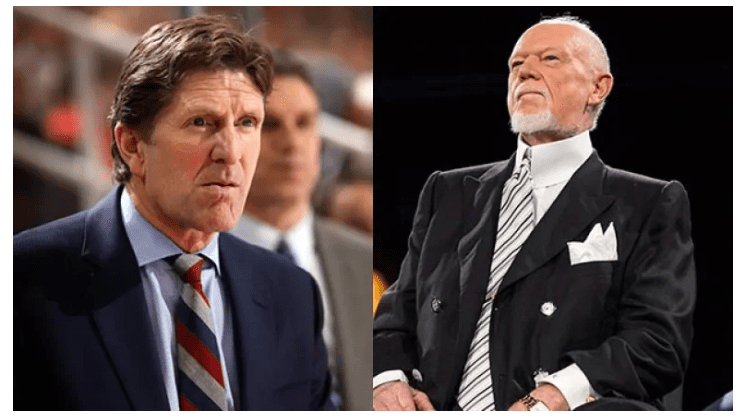Colorado Avalanche
The exits of Don Cherry, Mike Babcock and Bill Peters mark the tipping point of a change in the business of hockey

In less than two weeks, we’ve seen the forced departures of three very old-school NHL people – Don Cherry, Mike Babcock and (almost certainly) Bill Peters.
And in the process, I most certainly believe we are seeing a tipping point in the business of hockey, which for SO LONG has been ruled with an iron fist by a certain mindset, which might be categorized as: “Shut up and do as we say, shut up and take it, shut up and don’t complain, and if you do – if you do – you will be bounced out on your ass so fast it’ll make your $$%$^^&&#@ head spin, kid.”
If my life ended tonight and I was deposed to give one, on-the-record takeaway about covering pro hockey for 25 years it would be this: You are not supposed to complain about anything in the NHL or on-the-way-up-to-the-NHL, especially when it comes to Old Testament-style treatment from coaches or management. You don’t make waves. You don’t complain. You take it, no matter how bad the abuse, and you don’t whine about it. If you do whine about it, well that only means you’re soft. You couldn’t take it. You’re not tough enough.
This is where things, admittedly, get a little confusing to 54-year-old males like myself. I was raised in that old-school, no-whining world. And I take a look at all that’s been accomplished in that old-school world – interstate highways and skyscrapers and men on the moon and a country where we’re free to say what we believe without fear of being locked up for it (well, for a little while longer, at least) and I think ‘You know what, the old school worked pretty frigging well!’ And, ‘Look at how well guys turned out under absolute old-school, hardass coaches, like Vince Lombardi and Tom Landry and Knute Rockne and Scotty Bowman and Earl Weaver and on and on. They yelled at their players nonstop and played little mind games with them, and players hated them at the time, but then they all admit they never would have had the success they had without them.’
I don’t want to judge anyone, not Don Cherry or Mike Babcock or Bill Peters. I’m the last to judge anyone. I’m a forgiving guy. I have said many things I’ve regretted, and paid the price in many cases. In the worst cases, I’ve just tried to say “Sorry, I regret it” and tried to learn from it, and let my future actions tell the final story. If that is what’s in the heart of any of the above and they really ask for forgiveness and try to turn things into a positive, then I’ll be the first to shake their hand and grant them the chance. But who cares what I think?
I have to admit, though: I grew up in a world where there were just some really a-hole bullies in the coaching world. Coaches who felt they could say and do anything. Anyone who said anything about it was to be further bullied and ridiculed. One of my grade school coaches was a bully, someone who flat-out called you homophobic insults to your face if you didn’t do the drill right. I always shuddered inside at things like that – and for feeling like that, it was just pure luck in having educated parents who didn’t tolerate anything racial or homophobic. I was further lucky in going to a school that had some diversity. I had an African American man as my coach in junior high basketball, and I revered him. One of my dad’s best friends, on the commune in Vermont, was a white guy who had an African American man as a partner. How I revered being around both them of them too! They were smart and interesting and wonderful people. I didn’t think there was anything unnatural about this kind of partnership, at a young age. Lucky me. If I’d been raised by bigoted, intolerant parents who blamed “other people” for their troubles, the odds are likely very high I’d spout such opinions today.
Back then, though, I didn’t dare say anything back. Talk back to a coach, are you kidding? They were authority. They were coaches. They must know what they’re doing. Sit down and shut up. Sooooo many hockey players I’ve covered in these last 25 years thought the exact same thing. As we can see, though, that’s changing.
The bully-style of coach is on the way out, whether they like it or not. The coach who feels they can come in a room and humiliate people, all in the name of “toughening them up” – well, they just have to read the headlines of the last two weeks to know they won’t get away with it anymore.
I still believe coaches should be tough. Life is damn tough, and handing out participation trophies to kids does NOT WORK. I’ll argue with anyone on that one.
But there is a line between being tough and abusing people. Too many authority figures from my era thought it was OK to abuse younger people, all in the name of toughening them up. It doesn’t toughen anyone up in abusing them. It fucks them up.
The best coaches and people seem to know where the line is. There are going to be more shoes that drop in the coming days. Call this the “MeToo” era for coaches now.
I definitely think many of the next shoes to drop will be, unfortunately, about sexual abuse. As a kid who grew up in the ’70s and ’80s, I have my own stories. Sexual abuse was everywhere. My high-school basketball coach was imprisoned for a relationship with an under-age girl, and I rode in the same car as both of them. My assistant varsity basketball coach did time for sleeping with underage girls, too, and so were a couple others. Did this contribute to an effed view of relationships and ways of talking to women, for a long time, for me? I don’t know. I don’t like to play the victim. But did that stuff help me mature in good ways? Probably no.
When I was a 12-year-old kid going to a basketball camp in Nashua, N.H., I slept on the top bunk in a room full of fellow campers, most of whom were a couple years older than me. I was the young kid at the camp, which meant I got picked on a ton. But that was fine, I could take that, and still laugh that stuff off.
What wasn’t so hard to laugh off was the 50-something coach as part of that camp, who laid naked all the time, every time in his lower bunk, as I walked back to my bed and had to hoist myself up to the top bunk to go to sleep. I definitely remember the uncomfortable moment when my eyes briefly met his, on the way to the top bunk. It was scary. The look on his face was suggestive and scary. The feeling I had was one of “I’m 12 years old and have no idea what that leery look on your face is supposed to mean”, but I had a vague feeling that it was nothing good. What if that coach had come up to my bunk and done something? What would I have done? My fear is that I would have done: nothing. And then, been an effed-up victim of real trauma, for the rest of my life.
I’m lucky that didn’t happen, but look at how vivid this is to me all these years later. What would my memories be had something actually happened? That’s why I don’t take any story anybody says of anything similar lightly.
I have personally heard of stories of sexual abuse that happened between a hockey coach and a still-unnamed player from the junior/minor pro ranks. Should I go to the police about this? I don’t really know what the hell to do now. But maybe I should. At least, to get the accusations on some kind of record somewhere. When I was told all this, it was on the understanding of “You listen, but don’t tell.”
I tried to go to a camp counselor about my own experience in N.H., later on. The reply essentially was, “Don’t make waves, punk. Kids should be seen and not heard. He’s an esteemed person, and you’re nothing. Shut up and play ball.”
Hopefully, that old 12-year-old kid will be taken more seriously in the year 2019 and beyond.












